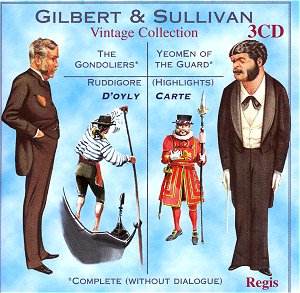The
long lasting relationship between the Gilbert and Sullivan Operas
and the D’Oyly Carte Company has meant that the audience would
see and hear the operas as Gilbert and Sullivan produced them.
The miracle is that for most of its history the Company continued
to maintain a high degree of freshness that is a compliment to
the management of the company and the committed dedication of
the artists.
The
Company recorded four sets of the Operas, the first two being
under the HMV label, first a set of acoustic recordings and then
a set in electrical 78s made during the late 1920s. Two sets were
also made under the Decca label, the first made around 1950 in
mono (the subject of this review); the second in stereo embraced
a period between 1959 and 1976 has just been reissued by Decca.
Interestingly, extracts of the second HMV sets are available on
CD (on the Prism and other labels) and sound surprisingly well.
We are thus in a position to compare recordings made over a period
of 75 years.
All
three performances on this set are successful. Darrel Fancourt
with his excellent deep bass baritone voice and clear diction
is outstanding in this repertoire. The men tend to dominate (Martin
Green, Leonard Osborn and Richard Watson are all impressive in
their respective ways), but Muriel Harding with her strong soprano
voice also makes a lasting impression, especially as Elsie in
yeomen. As usual with this company the ensemble work is outstanding
and every word can be heard (if only this were always the case
with all opera in English!). The chorus always sings well and
was successful as a training ground for future soloists.
The
work of the conductor in this repertoire is often underestimated;
Sullivan’s orchestration is often very subtle, especially with
his distinctive use of the woodwind. At the time of these recordings
the company spent a lot of time touring and did not have its own
orchestra. The conductor therefore had to take charge of theatre
orchestras of variable size and ability. The orchestra used in
these recordings is not identified but is probably a recording
orchestra of freelance musicians who play well under Isidore Godfrey.
Sir Malcolm Sargent helped to learn his trade with his early job
as conductor of the D’Oyly Carte (and features on several of the
second HMV series) however when he returned to G and S in the
1960s and 1970s (for both EMI and a Decca yeomen) he had lost
his original vitality and compared badly with the freshness and
vigour exhibited by Isidore Godfrey who conducted this repertoire
for over 40 years.
A
word of warning about the recording. The CD labels describe Disc
One as AAD but the other two discs are labelled as DDD – this
is clearly wrong and all three should have been labelled as AAD
or as ADD as appropriate. The mono recording sounds clear but
there is the slightest fizz on loud passages which suggest a straight
AAD transfer from LP pressings. The presentation is excellent
with a 16 page booklet with really useful notes by James Murray.
Arthur
Baker
